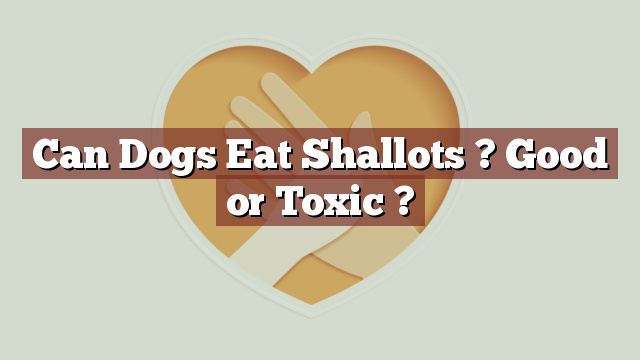Can Dogs Eat Shallots? Good or Toxic?
Knowing what foods are safe for our furry friends is essential for their overall health and well-being. This includes being aware of which foods should be avoided in a dog’s diet to prevent any potential harm. One such food that raises questions among pet owners is shallots. Let’s delve into the nutritional value of shallots for dogs and find out if they can safely consume this ingredient.
Nutritional Value of Shallots for Dogs
Shallots, a type of onion, are known for their distinct flavor and are often used in various cuisines around the world. They are rich in vitamins and minerals, including vitamin C, vitamin A, and potassium. Additionally, they contain antioxidants that can help boost the immune system and promote overall health.
Can Dogs Eat Shallots? Are Shallots Toxic to Dogs?
No, dogs should not eat shallots. Shallots, along with other members of the onion family such as onions, garlic, and leeks, contain compounds called thiosulphates. These compounds are toxic to dogs and can cause a condition called hemolytic anemia. Hemolytic anemia is characterized by the destruction of red blood cells, leading to symptoms such as weakness, lethargy, vomiting, diarrhea, and even organ damage.
It is important to note that both raw and cooked shallots should be avoided, as the toxic compounds are not affected by cooking or any other form of processing.
Potential Risks and Benefits of Shallots for Dogs
While shallots offer some nutritional benefits for humans, they pose significant risks for our canine companions. The potential dangers of shallots outweigh any potential benefits they may provide to dogs. It is crucial to prioritize the health and safety of our pets by keeping them away from shallots and any other members of the onion family.
What to Do If Your Dog Eats Shallots
If you suspect or witness your dog consuming shallots or any onion-related products, it is vital to seek immediate veterinary assistance. The quicker the treatment, the better the chances of minimizing any potential harm caused by the toxic compounds in shallots. Your veterinarian may induce vomiting or administer activated charcoal to prevent further absorption of the toxic substances.
Conclusion: Shallots Should Be Avoided in a Dog’s Diet
In conclusion, shallots are not safe for dogs and should be avoided in their diet. The toxic compounds present in shallots, known as thiosulphates, can lead to serious health issues, including hemolytic anemia. While shallots may offer nutritional benefits to humans, the risks they pose to dogs outweigh any potential advantages. As responsible pet owners, it is essential to be aware of the foods that may harm our furry friends and take necessary precautions to ensure their well-being. Always consult with a veterinarian if you have any concerns or questions regarding your dog’s diet.
Thank you for investing your time in exploring [page_title] on Can-Eat.org. Our goal is to provide readers like you with thorough and reliable information about various dietary topics. Each article, including [page_title], stems from diligent research and a passion for understanding the nuances of our food choices. We believe that knowledge is a vital step towards making informed and healthy decisions. However, while "[page_title]" sheds light on its specific topic, it's crucial to remember that everyone's body reacts differently to foods and dietary changes. What might be beneficial for one person could have different effects on another. Before you consider integrating suggestions or insights from "[page_title]" into your diet, it's always wise to consult with a nutritionist or healthcare professional. Their specialized knowledge ensures that you're making choices best suited to your individual health needs. As you navigate [page_title], be mindful of potential allergies, intolerances, or unique dietary requirements you may have. No singular article can capture the vast diversity of human health, and individualized guidance is invaluable. The content provided in [page_title] serves as a general guide. It is not, by any means, a substitute for personalized medical or nutritional advice. Your health should always be the top priority, and professional guidance is the best path forward. In your journey towards a balanced and nutritious lifestyle, we hope that [page_title] serves as a helpful stepping stone. Remember, informed decisions lead to healthier outcomes. Thank you for trusting Can-Eat.org. Continue exploring, learning, and prioritizing your health. Cheers to a well-informed and healthier future!

